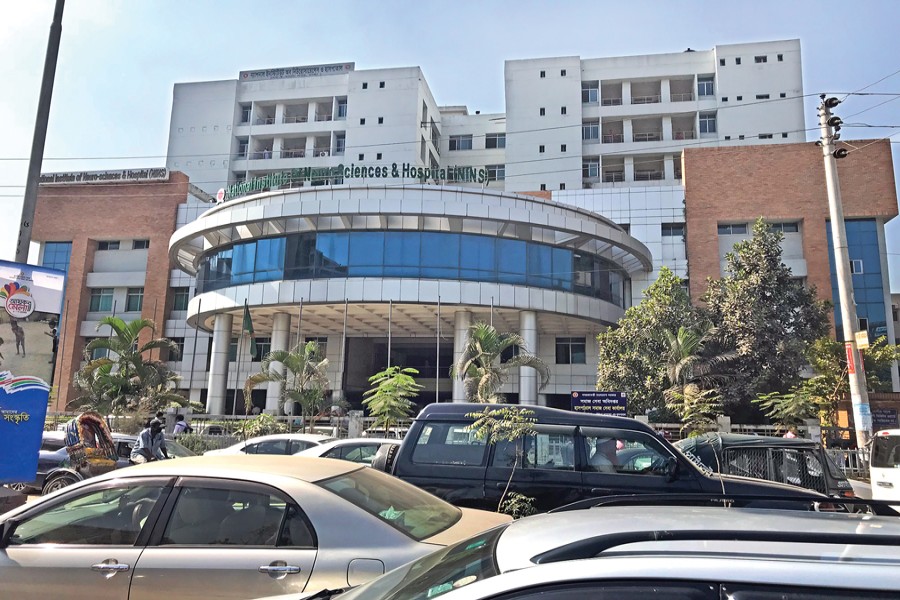Bangladesh's lone neurology hospital is seen as a boon, but it has to make do with limited capacity to treat a growing number of patients from across the country.
The five-year-old specialised hospital lacks adequate number of physicians, supporting staff and logistics for dealing with an ever-growing number of patients suffering from diseases of nerves, insiders and patients have said.
Unlike many other state-owned healthcare facilities, many of the patients expressed their satisfaction the service standards at the National Institute of Neurosciences and Hospital (NINH).
During several visits by this correspondent in recent weeks, the hospital was found clean and tidy enough and well-organised. However, crowds and long queues were seen in front of consultants' rooms and ticket counters at the Outpatient Department (OPD).
A patient coming from Barguna, Moqbul Hossain, was waiting at the OPD, located on the ground floor.
Asked, he said: "I have been waiting here for nearly one and a half hours to get advice from the doctor about my persistent headache for the last several days.
He also said his son bought ticket from the OPD counter after a wait for nearly an hour in the queue.
"I have come here after receiving positive feedback from one of my relatives about the hospital for its specialty in treatment of head-related complications," the septuagenarian said.
The NINH was established in 2012 in the city's Agargaon area aiming to provide specialised treatment to neurological patients, conduct research on neurosciences and raise more neurology experts in the country.
Sources said the number of patients at the hospital had almost tripled in the last five years, although the facilities didn't grow proportionately.
According to the official data, 34 posts of approved 84 consultants and 35 posts out of 79 medical technologists are still vacant.
Sources said on average 1500 people seek consultancy at the hospital's OPD. It was around five hundred at the beginning of the hospital.
They also said 30-35 patients are required to be admitted to the hospital for treatment.
The nine-storey NINS hospital has more than 300 beds for admitted patients at present.
Hospital sources said unlike other government hospitals, specialist physicians, including hospital' director and other top officials, regularly work at the OPD and round the wards.
They also said the authority doesn't allow patients admitted beyond capacity in order to maintain service standards.
An attendant to a patient, Ayesha Khanom, from Gazipur said her mother-in-law Honufa Begum had been admitted to the hospital for a week after she had suffered cerebral haemorrhage.
"The overall atmosphere of this hospital is much better compared to other government hospitals," she said.
They had to wait several days to get a bed empty, she added.
She also said senior consultants and other duty doctors regularly visited them at the ward, while the supporting staffs' behaviour was friendly enough.
"Senior sirs (doctors) visited us twice a day, while duty doctors and nurses were available when required," she said.
However, an official, not to be named as per briefing rules, said many 'high-ups' and political leader's request to the NINS top officials for providing counselling to their close ones very often interrupts the hospital's smooth operation.
Several attendants were found anxiously awaiting in front of Intensive Care Unit (ICU) on the third floor.
One Pear Ali from Pabna said his nephew had been admitted to the ICU for a week. "Pabna Sadar Hospital doctors advised us to come here after we had gone there for treatment,"
Asked about the facility at the hospital, he said attendants are only allowed twice a day to enter the ICU to see the patients. The attendants waiting in front of the ICU suffer as there is no seating arrangement and ceiling fan.
Many visitors were found sitting on floors for lack of seating arrangement in places.
However, other facilities at the hospital, including prayer hall, canteen and washrooms, were seen clean and well-maintained.
Resident Physician (RP) of the hospital Dr M S Johirul Haque Chowdhury said the facility is currently giving treatment through 150 beds for neuro-surgery and another 150 for neurology patients.
Regarding the huge pressure of patients, he said: "We are facing difficulties to cope with the huge crowd of patients compared to doctors, especially at the OPD".
"The government has approved only three posts for the outdoor here, but we have to manage the department with 15 doctors bringing in from other departments," he said.
"I think around 50 doctors are required to do consultancy at the OPD with ease, because more specialists can give better suggestion to the patients avoiding admission to the hospital," he said.
Terming the hospital a unique one in terms of its overall atmosphere, the RP also said the NINS is also regularly organising international conferences and other events to increase skills of its staff members.
"Recently we conducted deep brain stimulation (DBS) surgery, for the first time in the country," he said.
He also said the hospital has got the government's nod to expansion of its services by adding 500 more beds. It will construct another building next to the current one.
According to available official data, in the last calendar year (2016), 210,228 patients were attended at the OPD, while 20,130 came to the emergency.
A total of 11,755 patients were admitted to the hospital with 100 per cent bed-occupancy rate.
There are six modern operating theatres, 16-bed ICU, 12-bed HDU, six-bed Recovery Unit and 12-bed post-operative rooms in the hospital.


